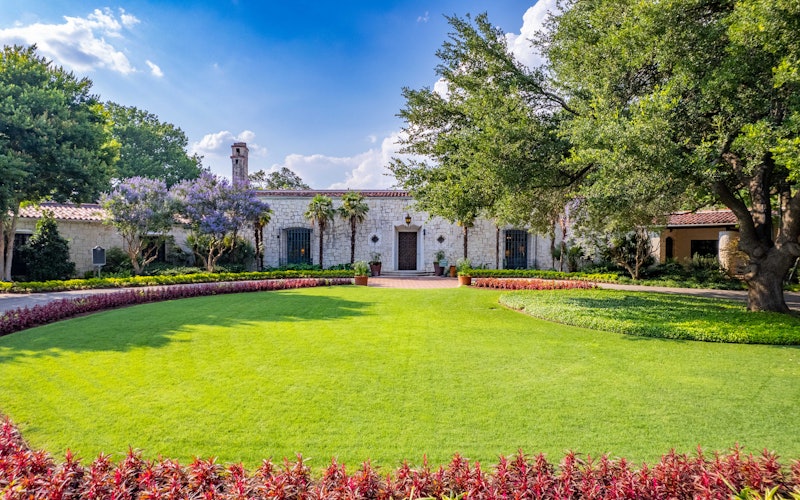
About the Arboretum
The Dallas Arboretum is a garden for all that enriches lives through beauty, learning, and connection.

The Dallas Arboretum Today
The Dallas Arboretum and Botanical Garden supports equal opportunity and accessibility for all and promotes a safe and engaging experience that welcomes all to enjoy. We seek to inspire and engage people of all backgrounds by creating a positive and impactful experience.
The Arboretum has been listed among the top arboretums in the world and the number of honors is so extensive it is listed on our website. The Dallas Arboretum is proud to offer the public an array of popular annual events, educational programs for children and adults, and an emphasis on family-oriented activities. Ground-breaking horticultural research conducted in our Trial Gardens continues to contribute to an important body of knowledge, both regionally and nationally.
Located on the shores of White Rock Lake, the Arboretum’s 66 acres include a complete life science laboratory with endless potential for discovery. The Arboretum has a 75 member Board of Directors, 220+ paid staff members, and more than 400 active volunteers.
Support for the Dallas Arboretum and Botanical Garden is provided by our members, donors and the Dallas Park and Recreation Department.
Our Future
Because the Arboretum is younger than many of the nation’s botanic gardens and arboreta, there is still considerable room for growth and development of the gardens as well as its research and education efforts. The Arboretum has plans to conduct Master Planning efforts in 2027 to visualize the Arboretum’s future growth opportunities.
Our Story
The Dallas Arboretum and Botanical Garden was founded upon the dreams of a few visionaries with a passion for preserving both history and nature. Though the gardens themselves are comparatively young, the work that went into creating the current gardens began long ago.
- In 1974, the Dallas Arboretum & Botanical Society, Inc. (DABS) adopted bylaws, elected officers and incorporated as a nonprofit organization.
- In 1977, the City of Dallas Park Board recommended that the grounds of the DeGolyer Estate, which the city purchased from Southern Methodist University, be the official location of the botanical garden. The city encouraged DABS to raise funds for the initial costs.
- During 1978 and 1979, DABS membership and awareness increased. Both business and local citizens began to support of the Arboretum project.
- By 1980, DABS had raised over one million dollars and purchased the 22-acre Alex Camp House, which is adjacent to the DeGolyer Estate. Both houses are located on White Rock Lake.
- In 1982, the City of Dallas and DABS signed a contract creating an arboretum and botanical garden on the combined 66 acres of the DeGolyer and Camp properties. The gardens opened to the public for the first time in 1984.
501(c)3 Non-profit Documentation

The DeGolyer House
The home of Everette DeGolyer (1886-1956) and Nell Goodrich DeGolyer (1887-1972) was designed to look 100 years old when it was built in 1939. Mr. DeGolyer was a geologist who ushered the oil industry into the age of technology with the use of the seismograph to find oil. Both Mr. and Mrs. DeGolyer were very active in the city of Dallas. The 21,000-square-foot home is Latin Colonial Revival style with 13 rooms, seven baths, five fireplaces, seven chimneys and a 1,750-square-foot library. Architects Denman Scott and Burton Schutt also included central air conditioning and heating when building the house. When the DeGolyers originally purchased the property, called “Rancho Encinal” because of the many live oak trees, it was being used as a 44-acre dairy farm. The DeGolyer House is on the National Register of Historic Places as well as the Texas Register of Historic Places. The house was recently renovated to re-create the look of the 1940s.

Alex Camp House
The Alex Camp House is an 8,500-square-foot home, which sits atop a gently sloping hill providing a stunning view of White Rock Lake. It was designed and built by well-known architect John Staub, and was completed in 1938. Both Alex Camp and Roberta Coke Camp were from prominent Dallas families, and Roberta was a generous philanthropist who supported local civic and charitable organizations including the symphony, art museum, ballet and her church. The house is a harmonious combination of Latin Colonial, English Regency and Art Deco styles. It is one room deep throughout, creating three exposures for all living and bedrooms.
Visit the Arboretum Today
See the historic sights and beauty of the Arboretum.